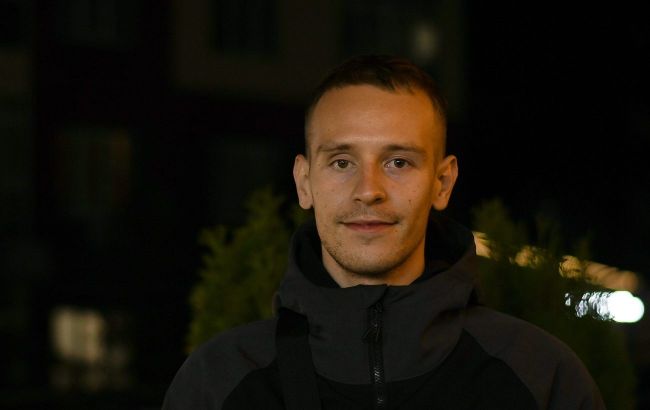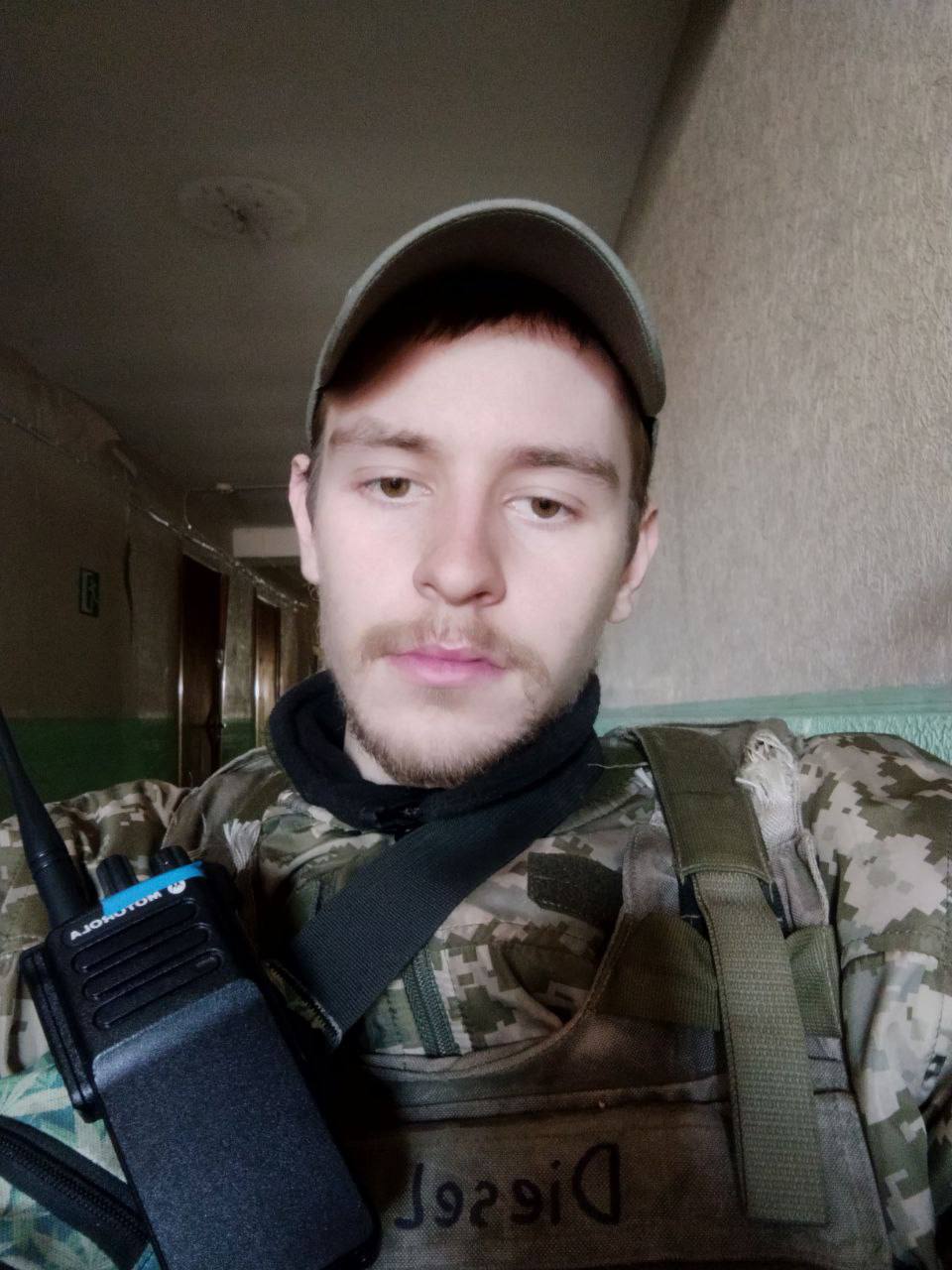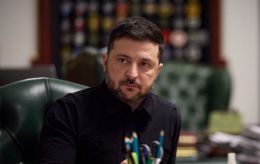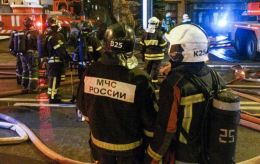'They wanted me to serve Russia': Mariupol defender recounts tortures in captivity, loss of an eye and survival
 Mariupol defender Oleksii Kobalkov (photo by RBC-Ukraine/Anastasiia Rokytna)
Mariupol defender Oleksii Kobalkov (photo by RBC-Ukraine/Anastasiia Rokytna)
The story of Mariupol defender Oleksii Kobalkov — about the first days of the invasion, the battles in the city and at Azovstal, his surrender and almost a year in Russian captivity, and his return home.
Oleksii Kobalkov served in the 23rd Maritime Guard Detachment of the State Border Guard Service of Ukraine. He joined the service voluntarily immediately after graduating from the Mariupol Marine Lyceum at the age of 18, initially as an engine operator and later as a senior engine operator on ships in the Sea of Azov.
A week before the full-scale invasion, there were almost constant alarms for combat training. And when at 4 a.m. on February 24, he was awakened by the signal "ship to battle," Oleksii did not understand at all where our ship was or what was happening. His first combat experience began in Mariupol, where he and his comrades faced severe injuries.
Later, Oleksii was transferred to various positions, including the Mariupol airport and the city center, where the task was to observe the enemy and defend the city. In an interview with RBC-Ukraine, former border guard Oleksii Kobalkov spoke about being wounded in Mariupol, losing an eye, and captivity after leaving Azovstal.
– How did you receive your first injury?
– On April 11, near the Zdorovya sanatorium in Mariupol. There's a 14-storey building that we have been holding since the beginning of April. A tank started taking us apart; it was coming out from Metalurhiv Avenue. It was firing at the upper floors.
We moved to the private houses nearby. I was injured in that house. Then, Zoomer (call sign - ed.), an Azov fighter who had since passed away, told me, "Go check the situation, see what's happening upstairs." I went up, turned around, and right then, artillery fire hit our house. The blast wave threw me into another room. My eyes got filled with sand. Then the guys evacuated me.
– Where were you after that injury? And what happened next?
– We were at the command and observation post, and during the night of April 14 to 15, they started transferring us to Azovstal. We gathered equipment, radios, and started loading everything into vehicles, into KrAZ trucks. Our wounded, those who were lying down… The vehicles were completely packed, and we were crammed in like sardines.
We moved out, and an enemy drone spotted us. We kept going, and I heard a pop; explosions started. I jumped out of the vehicle and ran to find a ditch. Looking around a bit, I realized where we were – in the industrial zone before Azovstal. The scene was terrifying: explosions were lifting the vehicles, and everything was being hit constantly. Every second, you could see another explosion or impact. The bridge was about 250 meters ahead, and we still had to reach it.
We were told to run on foot; it was no longer possible to move by vehicle, and staying there was deadly. By the time I reached the bridge, I had almost no strength left. The bridge was narrow, the chances of crossing it were low, but I wanted to at least get past that section. After running a bit, the guy who was running with us suddenly fell in front of me and started shouting, "The APC fell!"
I turned around and saw that the armored personnel carrier (APC) that was behind us had overturned. The driver had driven a wheel onto a partially destroyed part of the bridge and, in the chaos, couldn't orient himself. Everyone in the APC – those inside and those sitting on the sides – was injured. There were both killed and wounded… many wounded.
We kept running and reached the first bunker on the left bank of Mariupol – already on the plant's territory. When we ran into the basement, we realized it was a temporary shelter: an entrance on one side, an exit on the other, with no tunnels. There, we were told to wait for a guide who was supposed to lead us further.
 Oleksii's first combat experience began in Mariupol, where he and his comrades faced severe injuries (photo provided by Oleksii Kobalkov)
Oleksii's first combat experience began in Mariupol, where he and his comrades faced severe injuries (photo provided by Oleksii Kobalkov)
– What was happening in that bunker? What did it look like? Were there many people?
– Inside the bunker, I saw horrific scenes: people were being brought in half-alive, with shattered helmets, with various injuries — both the dead and the wounded, a lot of them. Then the guide arrived, and we realized it was still dangerous to go out — an enemy drone was constantly above us, watching for movement. When we started running across, it was firing nearby, though not accurately yet. Staying in the bunker for long made no sense — it was only a temporary shelter.
We successfully entered the plant's territory and moved deeper inside. We reached a tunnel, where vehicles picked us up and took us to well-equipped bunkers. Finally, I was at Azovstal and felt once again that I was among my own.
– What were your days at Azovstal like?
– We were positioned together with our unit. I stayed at the position without rotation, and they gave me a little time to rest — a slight rotation, so to speak. Then, on the 30th, they informed me that I was being assigned to the position on Slag Mountain, which is a hill at the edge of the plant, from where you can clearly see the left bank of Mariupol, where fighting was still ongoing.
We left for the transfer point, Beton, from the bunker Dzherelo, where my unit was stationed, and the next day we took up our position at night. From Beton to the hill it wasn't far — about 30–40 minutes on foot. There were five of us. We were on duty all night.
When our comrades took their shift at the position, we were supposed to replace them at 1 a.m. They took the position at 9 p.m., and we replaced them three hours later. During the night watch, we were almost constantly "tested" by artillery, machine guns, or mortars.
– Was your second injury there?
– Yes. We were sitting in the dugout, and we were being hit with fire every half hour. One of those random shots landed nearby, and the shrapnel flew inside. Several pieces wounded me: two in my right arm, one in my right thigh, one in my left thigh, and I found out about another piece of shrapnel only after I was released from captivity.
At first, I had no idea what had happened to my eye — I didn't feel pain or discomfort, only blood. We started to guess what it could be: a concussion, a hit to the helmet, or shrapnel.
They evacuated me to Beton. It was a bit demoralizing because my arms and legs almost didn't respond — I could only move my fingers. Without someone's help, even basic tasks like using the toilet were impossible. But there was medical assistance, and I'm grateful for it: they immediately gave me antibiotics, which saved my eyes from infection and prevented complications. The shrapnel sealed itself inside, and all the problems continued until the exchange.
I stayed in the Beton bunker until the 7th, as initially, priority was given to the more seriously wounded. It was hard to stand on my feet: the right leg hurt more, and it wasn't easy to use my arm for support. My left leg was feeling a bit better, and I used a crutch to help me move around.
On May 16, we had already arrived at the Dzherelo bunker. The commander gathered everyone and announced that an order had come to surrender into captivity. This, he explained, was not a voluntary surrender, but a decision by the command to save lives. They were promised adherence to the Geneva Convention, medical assistance, contact with relatives, and the presence of the International Committee of the Red Cross. "They told us that everything would be humane. We wanted to believe it would be so," Oleksii recalls.
By that time, he was almost out of strength — both legs were pierced by shrapnel, and his arm was shot. When the surrender was announced, the feelings were mixed: fear and relief, confusion and a faint hope that this was truly the path to salvation. On May 17, he was included in one of the last groups — he walked without a crutch because he had given it to a comrade who was in worse condition.
At the exit, Ukrainian soldiers handed over their weapons, trying to turn off their rifles — they poured sand into the receiver so that the mechanism wouldn't work. Along the river toward the bridge, they were escorted by cameras and the eyes of Red Cross representatives. "Everything looked public and supposedly civilized," he says. Already on the bus, Oleksii couldn't fill out the form himself — his right arm didn't work. The phone numbers of his relatives were never entered, so his family learned about his captivity only a few months later — through the Security Service of Ukraine (SBU).
– Where were you taken first?
– After we were taken to Olenivka, we arrived early in the morning on May 18. We were brought into a corridor for intake. The attitude toward us was relatively neutral. When we were captured, a new rotation of Russian guards arrived.
The new guards didn't have a clear understanding of how to deal with us, because they had previously worked with regular prisoners. They were afraid of us, since there were more than 600 people in the barracks. The overall conditions of detention were difficult due to overcrowding, rather than the administration's treatment.
As for medical care, I needed my wounds to be dressed. They used available materials, such as Ukrainian ointments or similar substances, to prevent the wounds from becoming infected. There was no extraordinary leniency because of injuries: even if someone was limping, the administration didn't pay attention, urging us to move faster to the canteen or other places.
– Were you interrogated by the Russians?
– My first interrogation was by the Russian Federal Security Service (FSB): they tried to "talk" to me, and were interested in my work as an engine operator on the ship. They tried to explain to us that Ukraine was supposedly divided from Poland and that returning would make no sense, and they offered us a job in the civilian fleet in Russia. I refused.
Later, there were two additional interrogations, this time conducted by representatives of the Russian Investigative Committee. Still, they were more formal, checking whether my answers matched the data the FSB had. They showed me a sheet listing the crimes allegedly committed by Ukraine, including the shelling of the Drama Theater in Mariupol and the maternity hospital, and they mentioned specific Azov fighters' call signs. I answered briefly: I know/don't know, saw/didn't see.
.jpg) The defender went through captivity and interrogations by Russian forces (photo by RBC-Ukraine/Anastasiia Rokytna)
The defender went through captivity and interrogations by Russian forces (photo by RBC-Ukraine/Anastasiia Rokytna)
– Were you held in Olenivka for a long time?
– We were held in Olenivka until June 10. That morning, everyone was lined up, and the names of approximately 200 people from the first group of soldiers were read out for departure. Before departure, we were searched again — they took everything except the most necessary items and told us that we were going for an exchange. Our wounds were not dressed at that time; the guards constantly watched to make sure we sat still.
The trip was extended: from Olenivka (Donetsk region) to Luhansk region, we traveled from morning to evening — approximately from 08:00 to 15:00–16:00. Only after that were we allowed to lift our heads — a high fence appeared in front of us, and we realized that we had been brought not for an exchange, but to a new prison. It was a real shock: inside, I had an explosion of emotions, because I sincerely believed we were being taken for an exchange.
– So you were transferred from one prison to another. What happened there?
– At the new place, the intake was harsher: they drove us with dogs and rubber batons, made everyone kneel, conducted searches, shaved us, took photographs, fingerprinted us, and recorded tattoos. However, when I entered the barracks, I saw that they had prepared mattresses, pillows, and blankets for us, and everyone could choose a bed on which to sleep. I lay down, stared at the ceiling, and fell asleep.
The only exceptions were cases when someone was called separately: for example, if someone had given up another person during interrogation in a different zone. Those people were beaten, psychologically pressured, subjected to electric shocks and rubber batons — they were forced to provide specific information out of them, in particular to pin certain crimes on someone.
– And how did other prisoners treat you?
– Interestingly, at the time of our arrival, there were about 250 "inmates" in the zone. Sometimes, when we passed by them, we heard "Slava Ukraini!" (Glory to Ukraine!"— a Ukrainian national salute). Many of them had been imprisoned since before the so-called LNR (Luhansk People's Republic — a Russian-occupied, self-proclaimed entity in eastern Ukraine - ed.) came, and they were unhappy with the current political situation. They warned us that if someone made a mistake, everyone would suffer — the classic collective punishment.
There were "competitions" — when a worker of the camp would order everyone to run to the lower yard and time it quickly. If we didn't make it within the allotted time, we had to redo it. These could be squats, push-ups — no one cared about those who were injured. My arms and legs were already functional, but for those with serious injuries, it was difficult, and the administration ignored this.
– How did you find out you were being exchanged? And how did it happen?
– In the second half of February 2023, they came to us and read out the lists. We stood for half an hour near the barrack that was the farthest from the administration building. We were taken to their headquarters, where a representative of the Luhansk "ministry" for human affairs was present, the region's ombudsman, who began explaining to us that we were on the exchange list.
He asked each person whether they wanted the exchange or wished to stay in the temporarily occupied territories of Luhansk or Donetsk regions. Everyone unanimously agreed to the exchange. You could see on his face that he didn't like that very much.
In the morning, however, nothing happened — we were told to wait. The guys in the barracks didn't sleep all night, thinking: "Will there be an exchange or not?" The next evening, a representative of the administration gathered us again, read out my group's plan, and allowed us to pack our things. Our hands were tied with tape, hats were put on us so we couldn't see the road, and we were loaded into vehicles. Then a plane.
After landing, we were taken by bus to the exchange point. Finally, the bus stopped, our blindfolds were cut off, and at that moment, one of the guys lifted his head and said, "We're home." I saw a Ukrainian representative in a bulletproof vest with a Ukrainian flag on it — it was an explosion of emotions I will never forget.
Then we were taken to Sumy, to a hospital, where we changed clothes, took a shower, each of us was given a phone, and I was finally able to call my mother. She was crying; I could barely hold back tears when I heard that she and her family had successfully left Mariupol and were in Poland. After that, we were taken to Kyiv, to the hospital, where the shrapnel was removed from my eye, and all the necessary procedures and treatment courses were done — everything in the best way.
– You were in captivity for a long time. Did you feel disoriented, as if you were moving from one reality to another?
– During the first few days after returning, my head was in complete chaos. On the one hand, I was happy to be back, but on the other, I felt lost, unsure of what to do or how to behave.
It felt unusual to experience care and attention from nurses, to see respect and gratitude around me. The first night I slept, but the second night I barely slept at all — I lay there scrolling through my phone, rereading the news, trying to make sense of what had happened during my absence. Sleep was problematic in the first days; everything felt very unfamiliar.
When I first stepped outside the hospital in Kyiv, I was literally shocked by everything around — people, cars, the noise of the city. I felt like a wild man who returned to everyday surroundings for the first time.
After returning from captivity, the shrapnel was removed from Oleksii's eye at the hospital in Kyiv, but his vision could not be saved — the retina had atrophied. Doctors were surprised that the fragment hadn't caused inflammation for ten months. Other shrapnel in his body was left — it didn't interfere.
At the beginning of 2024, a prosthesis was installed for him at the Filatov Institute of Eye Diseases and Tissue Therapy in Odesa. "I thought it would be obvious it was artificial, but it turned out to look like a real one," he says. Later, Oleksii was declared unfit for service, and he himself wrote a report requesting discharge. That was the end of his combat story, but not the end of his struggle.

